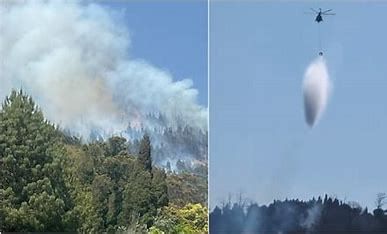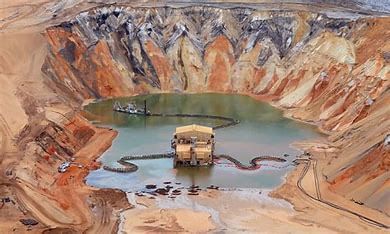UPSC Daily Current Affairs- 19th March 2024 | Current Affairs & Hindu Analysis: Daily, Weekly & Monthly PDF Download
GS-I
Barberton Greenstone Belt
Subject: Geography

Why in News?
Recent discovery of early earthquakes in the Barberton Greenstone Belt.
About:
- Location: Situated on the eastern edge of the Kaapvaal Craton in South Africa.
- Notable Features
- Famous for gold mineralization and komatiites, a unique type of ultramafic volcanic rock.
- Komatiites are named after the Komati River flowing through the belt.
- Age and Significance
- Contains some of the oldest rocks on Earth, over 3.6 billion years old.
- These rocks preserve some of the earliest evidence of life, second only to the Isua Greenstone Belt in Greenland.
- The Makhonjwa Mountains constitute 40% of the Barberton Greenstone Belt.
- Ultramafic Rocks
- Description
- Dark-colored igneous and meta-igneous rocks rich in magnesium and iron minerals.
- Low silica content and high magnesium oxide (>18% MgO) and iron oxide (FeO) content.
- Silica content below 45% with low potassium content.
- Composition
- Primarily composed of more than 90% mafic minerals.
- Thought to make up a significant portion of the Earth's mantle.
- Usually found in mountain-forming regions.
- Description
Source: Live Science
Forest fires in Nilgiris
Subject: Geography

Why in News?
Forest fires have been ongoing in the Coonoor forest range in the Nilgiris, Tamil Nadu.
- The Indian Air Force has recently supported firefighting efforts using a Mi-17 V5 helicopter for water-dropping operations.
Understanding Forest Fires/Wildfires
- Forest fires are unplanned, uncontrolled fires in areas with combustible vegetation.
- Causes include natural factors like lightning and man-made factors such as agricultural practices.
Frequency of Forest Fires in India
- Forest fires are common from November to June, with April-May being peak months.
- 36% of India's forest cover is prone to fires according to the India State of Forest Report (ISFR) 2019.
Regions Most Affected by Forest Fires
- Severe fires occur in dry deciduous forests with regions like Northeast India, Odisha, Maharashtra being highly vulnerable.
- Recent incidents in Mizoram, Manipur, Assam, Meghalaya, and Maharashtra have been reported.
Factors Contributing to Forest Fires in 2024
- High aridity, above-normal temperatures, and calm winds have led to increased incidents in southern India.
- Early availability of dry biomass due to above-normal temperatures has exacerbated the situation.
Climatic Conditions in Southern India
- Record-breaking temperatures in February 2024 have intensified the heat load in the region.
- The IMD has warned of a higher than normal Excess Heat Factor (EHF) over western Andhra Pradesh and Karnataka.
- Mild aridity due to lack of rain and high temperatures has affected most districts in southern India.
Source: The Hindu
Ocean Warming
Subject: Geography

Why in News?
Recent reports indicate a concerning trend in rising sea surface temperatures, with February 2024 marking a record high of 21.06 degrees Celsius globally, surpassing the previous peak of 20.98 degrees in August 2023.
Factors Contributing to Ocean Warming
- Greenhouse Gas Emissions: Human activities, notably the burning of fossil fuels since the Industrial Revolution, have led to a significant release of greenhouse gases like carbon dioxide, methane, ozone, and nitrous oxide. These gases trap heat in the atmosphere, resulting in a global temperature increase of at least 1.2 degrees Celsius above pre-industrial levels.
- Heat Absorption: Approximately 90% of the excess heat retained by greenhouse gases has been absorbed by the oceans over time, causing a gradual increase in ocean temperatures.
- Deforestation: The reduction of trees through deforestation limits the capacity to absorb CO2, elevating greenhouse gas concentrations and contributing to both global warming and subsequent ocean warming.
- Melting Ice: Rising global temperatures have led to the melting of polar ice caps and glaciers, introducing freshwater into the oceans. This influx can disrupt ocean currents, affecting temperature and salinity and further influencing ocean warming.
- Impact of El Niño: El Niño, characterized by abnormal warming of Pacific Ocean waters, has played a role in ocean warming and the overall increase in global surface temperatures.
- Natural Variability: While human activities primarily drive recent ocean warming, natural elements like volcanic eruptions, solar radiation variations, and ocean currents also contribute to short-term fluctuations in ocean temperature.
Implications of Rising Sea Surface Temperatures
- Disruption to Marine Ecosystems: Warmer oceans lead to increased stratification, where water segregates into layers based on density, disrupting essential ocean processes like mixing of nutrients and oxygen.
- Threat to Marine Life: Elevated temperatures hinder the proper mixing of water layers, impacting oxygen absorption and nutrient distribution, posing a threat to marine organisms' survival.
- Impact on Phytoplankton: Reduced nutrient transfer to the ocean surface jeopardizes phytoplankton populations, crucial for marine food webs, potentially leading to ecosystem collapse.
- Coral Bleaching: Corals, sensitive to temperature changes, expel algae under stress from warm waters, making them susceptible to diseases and mortality, disrupting marine ecosystems.
- Ocean Acidification: Warmer sea surface temperatures worsen ocean acidification by absorbing atmospheric CO2, lowering seawater pH, endangering marine organisms reliant on calcium carbonate shells.
- Extreme Weather Events: Increased sea surface temperatures fuel intense tropical storms and hurricanes, posing risks like stronger winds and heavier rainfall, threatening coastal regions and economies.
- Sea Level Rise: Thermal expansion from warm water contributes significantly to global sea level rise, increasing the frequency of severe flooding, erosion, and saltwater intrusion in coastal areas.
- Climate Pattern Impacts: Sea surface temperature fluctuations influence atmospheric circulation patterns, affecting weather phenomena like El Niño and La Niña, with widespread repercussions on agriculture, water resources, and ecosystems.
Conclusion
- Addressing the core reasons behind rising sea surface temperatures, particularly human-induced greenhouse gas emissions, is crucial to mitigating these effects and safeguarding marine and human well-being.
Source: Live Science
GS-II
Exercise Tiger Triumph
Subject: International Relations

Why in News?
Exercise Tiger Triumph is scheduled on the Eastern Seaboard from 18 to 31 March 2024.
About Exercise Tiger Triumph:
- Exercise Tiger Triumph is a joint tri-Service Humanitarian Assistance and Disaster Relief (HADR) Exercise involving India and the US.
- Its primary goal is to enhance interoperability for carrying out HADR operations and to refine Standard Operating Procedures (SOPs) for efficient coordination between the armed forces of both countries.
- After the Harbour Phase, the participating ships, carrying troops, will move to the Sea Phase to engage in Maritime, Amphibious, and HADR operations based on simulated scenarios.
- The Indian Navy will deploy ships equipped with helicopters and landing crafts, Navy aircraft, Army personnel and vehicles, Air Force aircraft and helicopters, and the Rapid Action Medical Team (RAMT) during the exercise.
Source: PIB
GS-III
National Payments Corporation of India (NPCI)
Subject: Economy

Why in News?
NPCI recently authorized One97 Communications Ltd (OCL) to operate as a Third-Party Application Provider (TPAP) within the Unified Payments Interface (UPI) framework.
- Four prominent banks - Axis Bank, HDFC Bank, State Bank of India, and YES Bank - will serve as Payment System Provider (PSP) banks for OCL, the parent company of Paytm.
Background:
- The Reserve Bank of India (RBI) instructed NPCI, the governing body of the UPI platform, to review OCL's request to function as a TPAP.
- A Third-Party Application Provider delivers UPI-compliant apps to end-users for facilitating UPI-based transactions, including mobile wallets and merchant apps.
About National Payments Corporation of India (NPCI)
- NPCI serves as the central organization overseeing retail payments and settlement systems in India since its inception in 2008.
- Established by the RBI and the Indian Banks' Association, NPCI operates as a non-profit entity under specified legal frameworks.
- The entity counts State Bank of India, Punjab National Bank, ICICI Bank, and others among its core promoter banks.
- Over the years, NPCI has expanded its shareholder base, welcoming various entities regulated by the RBI, including payment banks and small finance banks.
- NPCI offers a diverse array of payment services such as UPI, IMPS, NEFT, RTGS, BBPS, AePS, NACH, and RuPay, India's domestic card payment network.
Unified Payments Interface (UPI)
- One of NPCI's flagship initiatives, UPI revolutionizes digital payments by enabling seamless fund transfers between bank accounts using smartphones.
Payment Systems Operated by NPCI
- NPCI manages various payment systems, including the National Financial Switch (NFS), which constitutes India's largest network of interconnected ATMs.
- NFS facilitates services like cash withdrawals, card-to-card fund transfers, and cash deposits across multiple banks in the country.
Source: Hindu Business Line
Anthropocene
Subject: Science and Technology

Why in News?
An expert commission rejected a proposal to mark the start of the Anthropocene at a particular date.
What is the Anthropocene?
- The Anthropocene is a term used to describe the recent period in Earth's history when human activities began significantly impacting the planet's climate and ecosystems.
- This unofficial geologic time unit is not formally recognized like the Holocene, which started about 11,700 years ago after the last major ice age.
How Geologic Time is Divided?
- Earth's history is divided into eons, eras, periods, epochs, and ages based on rock layers and fossils found within them.
- Scientists study fossils to understand which organisms lived during specific periods, a field known as stratigraphy.
Debate over the Anthropocene
- Scientists debate whether the Anthropocene is distinct from the Holocene and whether it should be formally recognized as an epoch.
- The key question is whether human activities have altered Earth's systems to a degree that it can be observed in rock layers.
Origin of the Term
- The term "Anthropocene" comes from Greek words meaning "man" and "new," coined by biologist Eugene Stormer and chemist Paul Crutzen.
Source: National Geographic
REUSABLE LAUNCH VEHICLE PUSHPAK
Subject: Science and Technology

Why in News?
ISRO is preparing for the second landing test of the Reusable Launch Vehicle (RLV) Pushpak.
Background
- ISRO is working on reducing space launch costs and advancing India's space exploration missions.
- In 2023, ISRO achieved success with the Reusable Launch Vehicle Autonomous Landing Mission (RLV LEX).
About Reusable Launch Vehicle Pushpak
- The Reusable Launch Vehicle (RLV) Pushpak is a winged technology demonstrator created by ISRO.
- Its main goal is to test and validate technologies necessary for a fully reusable launch vehicle.
Background and Purpose
- The RLV Pushpak is part of ISRO's endeavor to develop a fully reusable launch vehicle.
- It aims to facilitate cost-effective access to space and support ISRO's goal of establishing a space station by 2035.
Technological Advancements
1. Accurate Navigation: Uses pseudolite systems, indigenous instrumentation, and sensor systems.
2. Ka-band Radar Altimeter: Supplies precise altitude data.
3. Indigenous Landing Gear: Tailored for high-speed, unmanned, and precise landings.
4. Aerofoil Honeycomb Fins and Brake Parachute System: Ensure controlled descent.
Source: Business Today
|
38 videos|5246 docs|1106 tests
|
FAQs on UPSC Daily Current Affairs- 19th March 2024 - Current Affairs & Hindu Analysis: Daily, Weekly & Monthly
| 1. What is the significance of the Barberton Greenstone Belt in terms of geological history? |  |
| 2. How do forest fires in Nilgiris impact the local ecosystem and communities? |  |
| 3. How does ocean warming affect marine life and ecosystems? |  |
| 4. What is the role of the National Payments Corporation of India (NPCI) in the country's financial ecosystem? |  |
| 5. What are the key features and benefits of a reusable launch vehicle like PUSHPAK? |  |
















